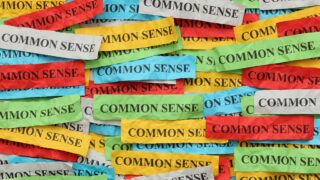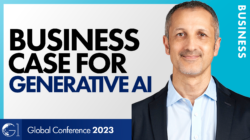Leading High Performing Remote Teams
How can leaders ensure that performance remains high in remote or hybrid-work environments?
Content Marketing
In this course, you’ll learn how compelling blogs, videos, podcasts, and other media can reach customers and drive sales. You’ll also learn steps for creating an effective content marketing plan, and some important ways to measure its impact and success.
Content marketing is a essential digital marketing strategy for companies looking to provide relevant and useful information to support your community and attract new customers.
Get started on your content marketing journey today.
Sustainable Innovation in Times of Disruption: Choices for a Better Society
There are opportunities for progress all around us. The key is to innovate on these opportunities sustainably.
To help identify most effective path forward, you'll need to gain a global perspective to these challenges in an open discussion. How can Japan and the world take action to create a more sustainable, innovative world? Where do you fit in?
It's time to find out.
Social Media & Digital Communications: Impact on Global Public Opinion
Social and digital media have dominated the communications industry for decades. But it's no secret that social media has the power to sway public opinion, and the way in which many companies use these platforms could be seen as manipulative.
What do companies need to be aware of when utilizing social and digital media? How can these mediums be used to better communicate strategically with the world?
Discover what top media and communications experts have to say.
CAGE Distance Framework
Want to expand overseas? The CAGE distance framework can help ensure you're constructing a solid global strategy in four areas: cultural, administrative, economic, and geographic. Learn how to leverage useful differences between countries, identify potential obstacles, and achieve global business success.
Servant Leadership
There's more to leadership than driving a team to profit. In fact, there's a word for looking beyond self-interest to prioritize individual growth: servant leadership. Try this course for a quick breakdown of what that is, how it works, and how it can lead to organizational success.
Strategy: Creating Value Inside Your Company
Have you ever wondered why certain companies are more successful than others? The answer is strategy: internal processes that control costs, allocate resources, and create value. This course from GLOBIS Unlimited can give you the tools you need for that strategic edge.
Strategy: Understanding the External Environment
To plan strategy on any level, you need to understand your company's external environment. In fact, your level of understanding can impact hiring, budgeting, marketing, or nearly any other part of the business world. Want to learn how to do all that? This course from GLOBIS Unlimited is the perfect first step!
Using Japanese Values to Thrive in Global Business
Japanese companies have unique cultural, communication, and operational challenges. But they also have values that have led to remarkable longevity. Check out this seminar to hear how these values help earn trust from overseas head offices and develop employees.
Marketing: Reaching Your Target
Every company works hard to get its products into the hands of customers. Are you doing everything you can to compete? In this course, you’ll find a winning formula to turn a product idea into real sales. Follow along through the fundamentals of the marketing mix and see how companies successfully bring products to market.
Basic Accounting: Financial Analysis
Want to compare your performance vs. a competitor? Or evaluate a potential vendor? Then you'll need to conduct a financial analysis. This course will teach you how to use three financial statements and evaluate financial performance in terms of profitability, efficiency, soundness, growth, and overall strength.
Career Anchors
What drives you to be good at your job?
Career anchors are based on your values, desires, motivations, and abilities. They are the immovable parts of your professional self-image that guide you throughout your career journey.
Try this short GLOBIS Unlimited course to identify which of the eight career anchors is yours!
Leadership with Passion through Kokorozashi
The key ingredient to success? Passion.
Finding your kokorozashi will unify your passions and skills to create positive change in society. This GLOBIS Unlimited course will help you develop the values and lifelong goals you need to become a strong, passion-driven leader.
It’s been said before, but certainly bears repeating: diversity is more than skin deep. Whether you’re facing differences in cultural upbringing, varied work experience, or simply opposing definitions of “common sense,” everyone is diverse in their own way. And since we’re all invested, we’re only hurting ourselves if we turn a blind eye to diversity.
But does that mean everyone needs to be an activist? Do we have to devote our whole lives to diversity efforts, or is there a middle ground?
Olivier Fabre, video journalist and diversity consultant at Pride House Tokyo Legacy, joins us to discuss how anyone can be a force for positive change.
“Activists are just the torchbearers of whatever ideal you’re looking for. The people following those torches are the ones that are going to make the most impact.”
Olivier Fabre
Transcript:
What is diversity, anyway?
Olivier Fabre:
Personally, [I think] diversity is what makes everyone. It is basically every single difference a person brings to the table. That is what diversity is. It’s often seen in very simplistic terms with labels. I think labels are just one easy way to identify diversity, but it’s a bit more than that. I think everybody’s diverse in so many different ways that diversity is about more than just women, men, LGBTQ+, and whatnot. So, you know, it’s a very broad understanding of what humanity is in a way.
Do you need to be an activist to make a difference?
Fabre:
I don’t think you need to be an activist to make an impact. I think, in fact, activists are just the torchbearers of whatever ideal you’re looking for. I think the people following those torches or following that path are the ones that are going to make the most impact. And I’m talking about even in a company, at home, making small changes in the way they speak and the way they talk about diversity and inclusion, if that’s what we’re talking about. They’re the ones that make the biggest impact.
The activists are always the minority, even the minority within the minorities. So their impact is going to be based on how many people actually listen to them and also do what is best for that cause. So, I think the biggest impact [comes from] those in companies that ask HR to change the policies on same-sex partners or talk to the bosses about . . . gender or unconscious bias.
They are not necessarily activists, but it’s the people on the ground [who] are doing the legwork on a daily basis that are actually the ones that make the most impact.
Next Article
7 Actions to Improve LGBTQIA+ Allyship in the Workplace
Kan: An Authentic Role Model Taking on Psychological Safety
How to Keep “Common Sense” from Ruining Diversity of Thought
How can business leaders handle diversity fairly?
Fabre:
It’s not about just picking, “Okay, I’ve got an LGBTQ member in my team, I’ve got a woman on my team, I’ve got somebody of a different background on my team, and that’s done.” It’s actually ensuring that those that don’t have the proper training management to be in that team actually get it.
I see a lot of women being placed in positions where they’re made to fail at the end because they don’t have the training. They don’t have the network. And it backfires in the sense that people then say, “Well, you know, that’s because we put a woman in charge.” It’s like, well, you didn’t train her. You didn’t let her be herself.
And I don’t think it’s only women. I personally felt that, as a member of the LGBTQ community, I didn’t have the old boys’ network in my company, or the mentorship group in my company, either. So it’s not just women. Minorities, I’m sure, in countries where there are a lot of minorities, will also probably feel the same. So ensuring that training is in place is very important.
What is diversity of thought?
Fabre:
Diversity is always seen as, you know, the color of your skin, your sexuality, or your gender, or your physical abilities. But I think it’s diversity of thought, as well. And I think it’s extremely important to be able to accept and understand that people have different opinions. Some of them—not all the opinions will be agreeable to you. You might find some very disagreeable. But at the same time, they’re still human, and that’s part of the diversity. And you might not reach a consensus, but it’s important that you try and talk to each other.
Who is diversity really for?
Fabre:
I think you get people saying, “Oh, all this diversity stuff, it’s just—I’m not part of it. It’s got nothing for me.”
It is for everyone, in many ways. And it needs to be an issue everybody feels close to and not ostracized [from] because it’s “just the LGBTQ,” it’s “just women,” or it’s “just” a different minority.





